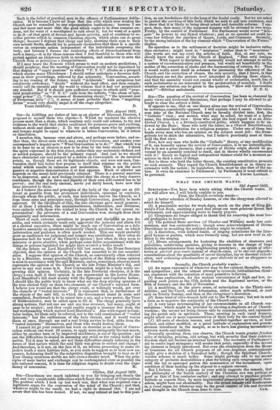WHAT THE CHURCH WANTS.
23d August 1852.
Sniersion—You have been wisely asking what the Church wants. If you will allow me, I will briefly explain to you.
First, the Church certainly wants—
(a) A better selection of Sunday Lessons, or else the clergyman allowed to select for himself.
(b) A practicable service for week-days, much on the plan of King pi- ward's First Book, omitting a good deal about our most gracious Queen and Parliament, and approximating more to family prayers.
(c) Clergymen no longer obliged to thank God for removing the most hor- rid profligates to heaven. (d) The political State services (of Charles and William) made less acri- monious, and less contradictory ; though some acknowledgment of Divine Providence in moulding the national destiny might be retained.
(e) A discretion, with defined limits, of singing substitutes for the litur- gical hymns or psalms, which were formerly sung, but are now read in ad- dition to the singing. (f) Divers arrangements for hastening the abolition of sinecures and pluralities, subdividing parishes, giving to deacons in the charge of large districts superintendence from neighbouring presbyters ; an option of offer- tories or partial pew-rents instead of church-rates, or to eke out stipends ; consultations about the possibility of moral discipline, lay or diaconal exhort- ation, and ordaining schoolmasters in poor districts to act as clergynwn on the Sunday. Secondly, the Church probably wants— (a) An organ expressive of whatever may be her existent thoughts, wants, and sympathies; and the utmost attempt to reconcile latitudinarian think- ers, consistent with the retention of more primitive believers.
(b) Some explanation, for the mutual convenience of high and low, re- garding such points as the 17th Article and the Baptismal service, or the 30th of January and the 5th of November. (c) A modifying, in the above sense, of subscription to the Thirty-nine Articles ; and the Creed, called Athanasian, either much softened, or read only on Trinity Sunday, and then at the clergyman's discretion. (d) Some kind of olive-branch held out to the Wesleyans ; but not in such a form as to negative the continuity of the Church orders. (e) A very large intermingling of lay communierints in all Church con- sultations: which might be provided by electing a,duplicate set of Church- wardens ; the second set being chosen only by communicants, and represent- ing the parish only in spirituals. These, meeting in each rural deanery, might select one or more representatives of their body for the central Synod. (,f) All sorts of obsolete canons, and jumbled-together services, at least revised, and either modified, or a great latitude of explanation and permis- siveness introduced in the margin, so as to have less glaring inconsistency between words and realities.
Generally speaking, then, you observe, the Church wants greater freedom alike of thinking, praying, and acting, but with security that their extrinsic freedom shall not become an internal tyranny. The necessity of Parliament's aid to confer legal stringency will secure that point, especially if the devout lay element is largely introduced. But even the elimination from the House of Commons for all Church purposes of all non-Anglican communicants might give a skeleton of a Synodical laity ; though the Spiritual Church- warden scheme is much better. Some might perhaps add to my second category of probable deairabilities a plan for letting each congregation share with the lay or episcopal patron the nomination of the incumbent, upon condition of their making up the stipend to a certain amount. But I forbear. Only a phrase in your article suggests the remark, that the philosophy of the fourth century of the Christian rera was perhaps as good as that of four centuries earlier ; and any attempt to purchase greater latitude as regards Nice, by. more inquisitorial prescription as regards Jeru- salem, might turn out abominably. But the grand remedy and desideratum is, a vocal organ for whatever may be the great current of life and devotion
and thought in the Church from time to time. Cox.


























 Previous page
Previous page